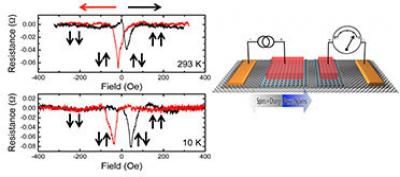Researchers from the U.S. Naval Research Laboratory (NRL) developed a new type of room-temperature tunnel device structure in which the tunnel barrier and transport channel are both made of graphene.

In this new design, hydrogenated graphene acts as a tunnel barrier on another layer of graphene for charge and spin transport. The researchers demonstrated spin-polarized tunnel injection through the hydrogenated graphene, and lateral transport, precession and electrical detection of pure spin current in the graphene channel. The team sasy that the spin polarization values are higher than those found using more common oxide tunnel barriers, and spin transport at room temperature.
The NRL team demonstrated the higher spin injection efficiency (16.5%) than most previous graphene spin devices, determined spin lifetimes with the Hanle effect, and observed only a 50% loss in spin valve signal from 10 K to room temperature (left graph).